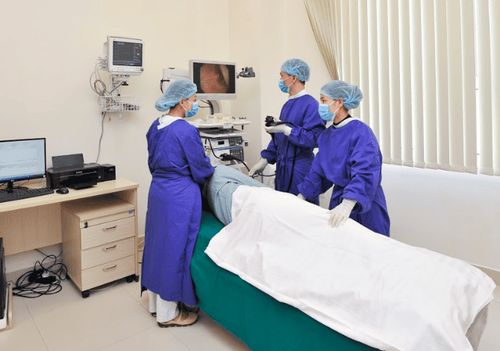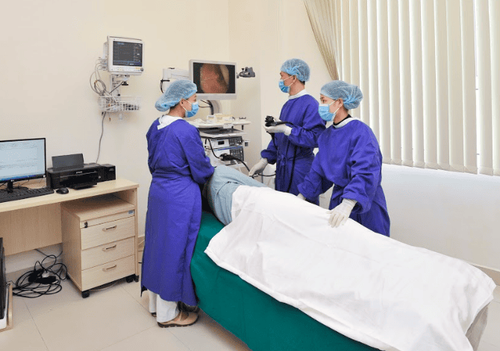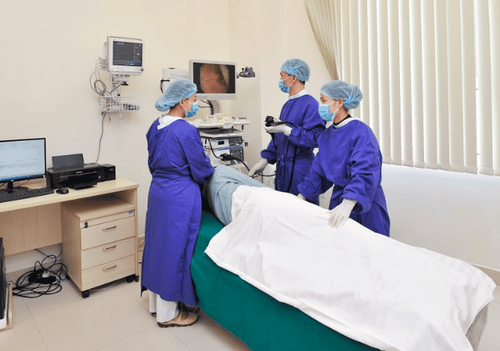This is an automatically translated article.
The article is professionally consulted by Master, Doctor Mai Vien Phuong - Gastroenterologist - Department of Medical Examination & Internal Medicine - Vinmec Central Park International General Hospital.Diagnostic laparoscopy is an essential test to accurately diagnose the condition and damage of organs inside the abdomen. When should a diagnostic laparoscopy be performed?
1. What is diagnostic laparoscopy for?
Diagnostic laparoscopy is a form of laparoscopic surgery to look at the organs inside the abdomen and pelvis. During the diagnostic endoscopy, if the doctors find an abnormal problem that can be treated immediately, some minor surgery will be performed.
Diagnostic laparoscopy is an effective method of determining the cause of lower abdominal and pelvic pain, including female infertility and women's menstrual problems. Diagnostic laparoscopy is very effective in diagnosing endometriosis, pelvic adhesions, infection, ectopic pregnancy, ovarian cysts, uterine fibroids...
2. When is diagnostic laparoscopy needed?
Patients after performing X-ray tests, abdominal ultrasound, laparoscopy can detect abnormal problems but do not have enough necessary information. Patients will be assigned diagnostic laparoscopy to directly observe the abdomen, determine the cause, location of the injury and the extent of the damage. In addition, diagnostic laparoscopy may also be indicated for biopsy specimens.
Diagnostic laparoscopy is usually done to examine the following organs:
Liver Bile Pancreas Spleen Appendices Small intestine and large intestine Stomach Reproductive organs Pelvic organs. Diagnostic laparoscopy can identify conditions such as:
Abdominal pain There is fluid in the abdominal cavity There is a tumor in the abdomen Liver disease Check the effectiveness of some treatments Determine the progression of the disease cancer.

3. How is laparoscopy performed?
Before performing diagnostic laparoscopy, the patient should fast for 8 hours. If you need to take medication for 8 hours before surgery, you should consult with your doctor.
The diagnostic laparoscopy procedure goes as follows:
The patient is anesthetized before the surgery The doctor will make a small incision in the abdominal wall From the incision, the doctor will insert some surgical instruments The endoscope is inserted into the patient's abdomen. The diagnostic laparoscopy process takes about 15-20 minutes.
4. Possible symptoms after laparoscopy diagnosis
Patients after surgery may have some symptoms such as:
Fatigue, discomfort. Lightheaded, dizzy. These are normal symptoms as a side effect of the anesthetic. These symptoms will quickly disappear; Pain and discomfort at the incision site; Feeling of bloating, abdominal pain, shoulder pain because during the endoscopy, the doctor pumped some gases into the body. These symptoms may go away after 1 day; If the patient has serious symptoms such as high fever, cold shivering fever, severe abdominal pain, leg swelling, lack of strength... they need to go to the hospital for examination immediately.
Recovery time from surgery is different for each person, depending on the reason you have this surgery and the health status of each person. Usually, patients can return to their normal activities 5 to 6 days after surgery.

5. Complications after diagnostic laparoscopy
Like many other types of laparoscopic surgery, diagnostic laparoscopy cannot be 100% safe. However, complications after diagnostic laparoscopy are very rare.
Complications the patient may encounter such as:
Complications from anesthetics Infection of the incision Inflammation of the abdominal wall A blood clot penetrates the blood vessels of the legs, lungs, pelvis, more dangerous than the heart or Brain Bleeding in the abdominal cavity Compared with open surgery, laparoscopic surgery has more advantages thanks to small scars, less pain, short hospital stay, quick recovery, and early return to normal life. To limit some complications of diagnostic laparoscopy, patients should choose to perform this technique at reputable hospitals.
Vinmec International General Hospital with a team of leading experts and investment in modern equipment is ready to meet the needs of patients' laparoscopy. Coming to Vinmec, patients will be technically conducted in absolute aseptic conditions, the modern endoscope system Olympus CV 180 allows detecting very small lesions (only a few millimeters) and pinpointing the exact location. to locate lesions for biopsy to find cancer cells, to treat polyps, to screen for HP bacteria.
The whole process will be handled by a team of experienced doctors in the field of endoscopy and treatment of digestive diseases, all patient needs will be consulted and cared for
Please dial HOTLINE for more information or register for an appointment HERE. Download MyVinmec app to make appointments faster and to manage your bookings easily.














